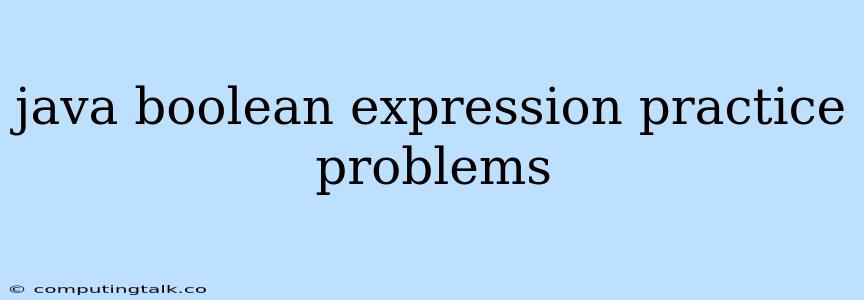Java boolean expressions are a fundamental aspect of Java programming. They are used to represent conditions that can be either true or false, and they form the basis of decision-making in your programs. Mastering boolean expressions is essential for writing effective and logical code.
What are Boolean Expressions?
A boolean expression in Java is a combination of variables, operators, and literals that evaluates to either true or false. Let's break down the key components:
- Variables: These are placeholders that store data, which can be of various data types. In the context of boolean expressions, variables can be of type
boolean. - Operators: These are symbols that perform operations on variables and values. Some common boolean operators include:
&&(AND): Returns true only if both operands are true.||(OR): Returns true if at least one operand is true.!(NOT): Negates the truth value of its operand.==(Equal to): Returns true if both operands have the same value.!=(Not equal to): Returns true if both operands have different values.<(Less than): Returns true if the left operand is less than the right operand.>(Greater than): Returns true if the left operand is greater than the right operand.<=(Less than or equal to): Returns true if the left operand is less than or equal to the right operand.>=(Greater than or equal to): Returns true if the left operand is greater than or equal to the right operand.
- Literals: These are constant values that are directly written in the code. For boolean expressions, the literals are
trueandfalse.
Why are Boolean Expressions Important?
Boolean expressions are crucial for controlling the flow of your programs. They allow you to make decisions based on specific conditions:
- Conditional Statements (
if,else if,else): These statements execute different blocks of code depending on the truth value of a boolean expression. - Loops (
for,while,do-while): Boolean expressions determine when to continue or terminate a loop, enabling you to iterate through blocks of code multiple times.
Practice Problems
Here are some practice problems to test your understanding of boolean expressions:
Problem 1:
Write a Java program to check if a number is even.
import java.util.Scanner;
public class EvenNumberCheck {
public static void main(String[] args) {
Scanner scanner = new Scanner(System.in);
System.out.print("Enter a number: ");
int number = scanner.nextInt();
if (number % 2 == 0) {
System.out.println(number + " is even.");
} else {
System.out.println(number + " is odd.");
}
}
}
Problem 2:
Write a Java program to check if a year is a leap year.
import java.util.Scanner;
public class LeapYearCheck {
public static void main(String[] args) {
Scanner scanner = new Scanner(System.in);
System.out.print("Enter a year: ");
int year = scanner.nextInt();
if ((year % 4 == 0 && year % 100 != 0) || year % 400 == 0) {
System.out.println(year + " is a leap year.");
} else {
System.out.println(year + " is not a leap year.");
}
}
}
Problem 3:
Write a Java program to check if a character is a vowel.
import java.util.Scanner;
public class VowelCheck {
public static void main(String[] args) {
Scanner scanner = new Scanner(System.in);
System.out.print("Enter a character: ");
char character = scanner.next().charAt(0);
if (character == 'a' || character == 'e' || character == 'i' || character == 'o' || character == 'u' ||
character == 'A' || character == 'E' || character == 'I' || character == 'O' || character == 'U') {
System.out.println(character + " is a vowel.");
} else {
System.out.println(character + " is not a vowel.");
}
}
}
Problem 4:
Write a Java program to check if a triangle is valid.
import java.util.Scanner;
public class TriangleCheck {
public static void main(String[] args) {
Scanner scanner = new Scanner(System.in);
System.out.print("Enter the first side of the triangle: ");
int side1 = scanner.nextInt();
System.out.print("Enter the second side of the triangle: ");
int side2 = scanner.nextInt();
System.out.print("Enter the third side of the triangle: ");
int side3 = scanner.nextInt();
if (side1 + side2 > side3 && side1 + side3 > side2 && side2 + side3 > side1) {
System.out.println("The triangle is valid.");
} else {
System.out.println("The triangle is not valid.");
}
}
}
Problem 5:
Write a Java program to check if a number is positive, negative, or zero.
import java.util.Scanner;
public class NumberCheck {
public static void main(String[] args) {
Scanner scanner = new Scanner(System.in);
System.out.print("Enter a number: ");
int number = scanner.nextInt();
if (number > 0) {
System.out.println(number + " is positive.");
} else if (number < 0) {
System.out.println(number + " is negative.");
} else {
System.out.println(number + " is zero.");
}
}
}
Tips for Solving Boolean Expression Problems
- Break Down Complex Conditions: If the problem involves multiple conditions, break them down into smaller, more manageable expressions.
- Use Parentheses: Parentheses can help clarify the order of operations and make your code more readable.
- Test Thoroughly: Test your code with different inputs to ensure it handles all possible scenarios correctly.
- De Morgan's Laws: Use De Morgan's laws to simplify boolean expressions involving negation and logical operators (AND, OR).
Conclusion
Understanding boolean expressions is essential for writing effective and flexible Java programs. By practicing with these problems, you can gain a solid foundation in conditional logic and decision-making. Remember to focus on clarity, correctness, and thorough testing.
